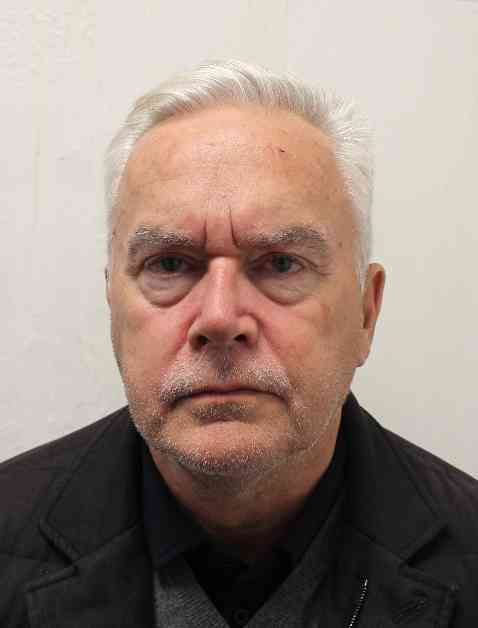Disgraced broadcaster Huw Edwards has been sentenced to a six-month suspended sentence for accessing indecent images of children. The 63-year-old admitted to three charges of “making” indecent photographs after receiving 41 illegal images from convicted paedophile Alex Williams via WhatsApp.
The images shared with Edwards by Williams included seven of the most serious type, with the estimated age of most children being between 13 and 15, and one child aged between seven and nine. Chief Magistrate, district judge Paul Goldspring, remarked that Edwards’ “long-earned reputation is in tatters” during the sentencing.
Judge Goldspring highlighted that Edwards, who had previously been of good character, now faced significant repercussions for his actions. Despite being handed a suspended prison sentence for two years, Edwards was also required to complete a sex offender program as part of his punishment.
Prosecutor Ian Hope revealed in court that there was a sexual nature to the WhatsApp chats between Williams and Edwards, with Edwards paying significant sums of money to Williams on multiple occasions. The money was reportedly used to support Williams at university, amounting to around £1,000 to £1,500.
The court heard that Edwards did not respond after Williams sent him a sexual video involving children aged around seven to nine and 11 to 13. Despite this, Edwards continued to engage in conversations with Williams, with the exchange escalating to the sharing of indecent images of children.
Philip Evans KC, defending Edwards, emphasized that Edwards did not make payments to Williams in exchange for indecent images and did not store them on any device for personal gratification. Evans expressed Edwards’ remorse for the harm caused to his family and loved ones, as well as for committing the offenses.
The images involved in Edwards’ case ranged from category A, the most serious, to category C, the least serious. Category A images include penetrative sexual activity, while category B images involve non-penetrative sexual activity. Category C images are those that do not fall into categories A or B.
The Sentencing Council defines category A images as those involving penetrative sexual activity, sexual activity with an animal, or sadism. Category B images involve non-penetrative sexual activity, while category C images are indecent images that do not fit into categories A or B.
According to the Crown Prosecution Service (CPS), the definition of “making” an indecent image has been broadly interpreted by the courts. It can range from opening an attachment to an email containing an image to accessing pornographic websites where indecent photographs of children appear through an automatic “pop-up” mechanism.
In Edwards’ case, he received the illegal images as part of a WhatsApp conversation with Williams. The court proceedings shed light on the disturbing nature of the conversations and exchanges between Edwards and Williams, highlighting the severity of the offenses committed.
As the story of Huw Edwards’ sentencing for accessing indecent images of children continues to unfold, it serves as a stark reminder of the importance of upholding ethical standards and the legal consequences of engaging in such reprehensible behavior.
Impact on Society
The case of Huw Edwards serves as a sobering reminder of the prevalence of online child exploitation and the devastating impact it has on society. The accessibility of digital platforms has facilitated the distribution and consumption of indecent images, making it imperative for authorities to crack down on offenders and protect vulnerable children.
The sentencing of a prominent figure like Edwards sends a strong message that no one is above the law when it comes to crimes against children. It also serves as a warning to others who may be engaging in similar illicit activities, highlighting the severe consequences that await those who partake in such criminal behavior.
Preventive Measures
In light of cases like Huw Edwards’, it is crucial for society to prioritize preventive measures to combat online child exploitation. This includes raising awareness about the dangers of accessing indecent images, educating the public on how to report suspicious activities, and providing support to victims of such crimes.
Law enforcement agencies must also enhance their efforts to track down and prosecute individuals involved in the distribution and consumption of illegal images. Collaboration between technology companies, government agencies, and advocacy groups is essential to effectively combatting online child exploitation and protecting children from harm.
Conclusion
The sentencing of Huw Edwards for accessing indecent images of children serves as a stark reminder of the need to address the prevalence of online child exploitation. It underscores the importance of enforcing strict laws, raising awareness, and implementing preventive measures to safeguard vulnerable children from harm.
As society grapples with the disturbing reality of online child exploitation, it is imperative for individuals, communities, and authorities to work together to combat this heinous crime. The repercussions of such offenses are severe, as demonstrated by the case of Huw Edwards, and serve as a warning to those who engage in illegal activities involving children.
It is essential to prioritize the protection of children, uphold ethical standards, and hold offenders accountable for their actions. By collectively taking a stand against online child exploitation, we can create a safer and more secure environment for children to thrive and grow without fear of exploitation or harm.












